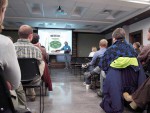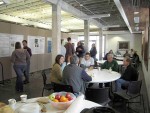The Konza Prairie LTER program (KNZ) hosted its 19th annual LTER Workshop on March 28, 2009, at the recently dedicated Konza Prairie Biological Station Meeting Hall (KMH).
The KMH is the result of an extensive renovation of an historic limestone barn, built in 1910. Extensive remodeling of the former barn, completed in fall of 2008, created a modern and highly flexible meeting space at the field station, while preserving the historic character of this traditional early 20th-century stone building. The facility includes the Cortelyou Lecture Hall, which seats approximately 100 people and includes high-quality audio visual capabilities and wireless internet access. The KMH also has a large multi-purpose room, which includes 1,850 square feet of space that can be configured for workshops, posters and other research displays, social gatherings, and education programs
The KNZ LTER workshop is an annual event that brings together senior scientists, students and staff for a day of research presentations, planning activities, and informal social interactions. These meetings are increasingly important for bringing together local and off-campus investigators. The 2009 workshop included investigators, students, staff and docents from Kansas State University, as well as researchers and students from Colorado State University, Oklahoma State University, Southern Illinois University, University of California Santa Cruz, and Yale University. The meeting was well attended, in spite of an unusual spring storm that blanketed the site with several inches of snow!
The scientific program included a full day of oral presentations by graduate students and senior scientists, as well as poster presentations. Topics ranged from soil and plant processes, to grassland stream ecology, to impacts of regional land-cover change. Presentations included updates on the status of ongoing LTER activities, highlights of recent research accomplishments, and planning for new experiments being implemented as part of the KNZ LTER VI renewal. These new initiatives include studies focused on responses to heterogeneity induced by patch burning-grazing, grassland restoration ecology, and impacts of land-cover change on terrestrial and aquatic ecosystems. An LTER Principal Investigators' meeting followed the formal presentations. There were ample opportunities for informal interactions throughout the day, and the scientific program was followed by a casual dinner, featuring grilled bison burgers and local microbrews.

 Enlarge this image
Enlarge this image
